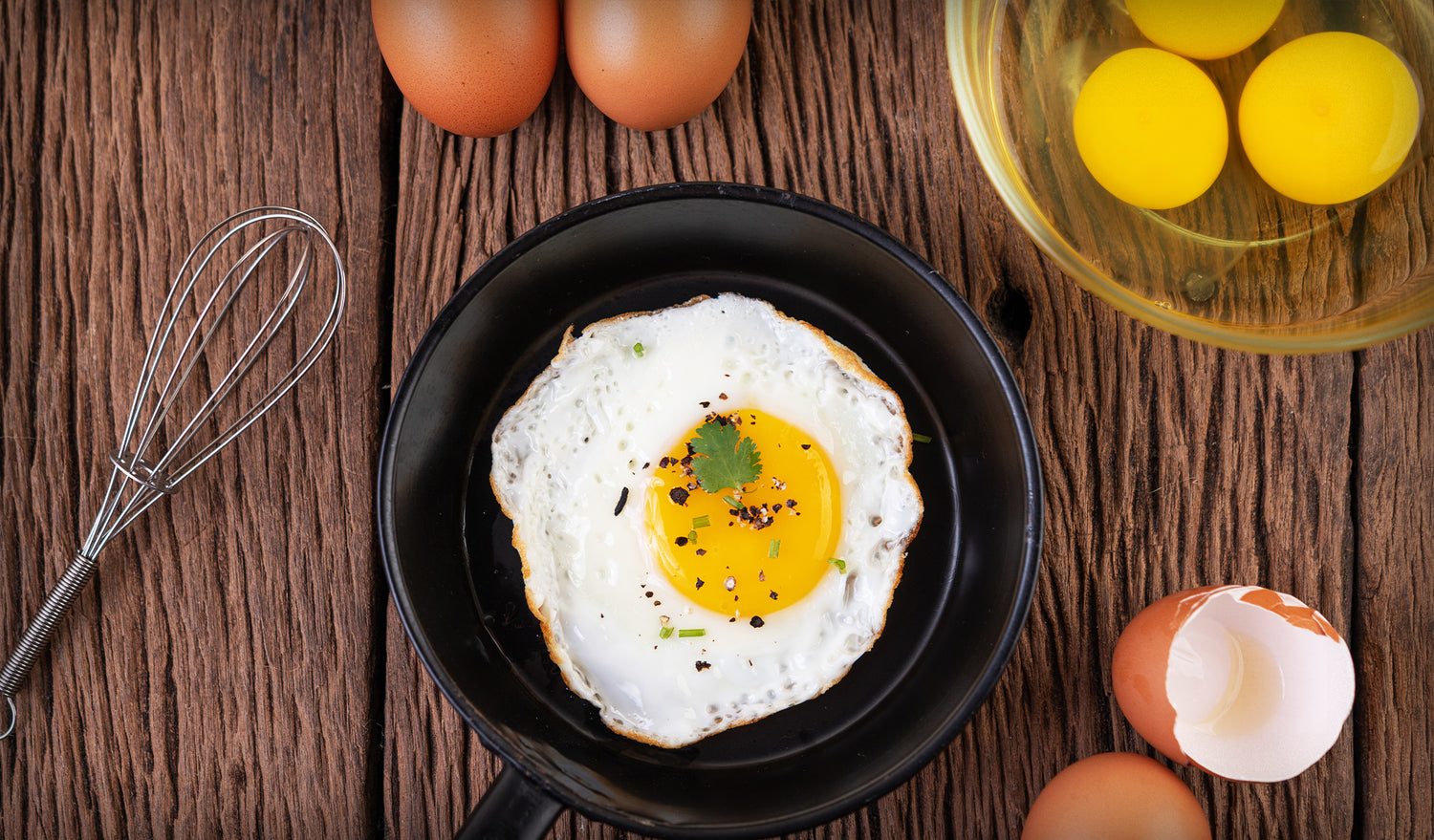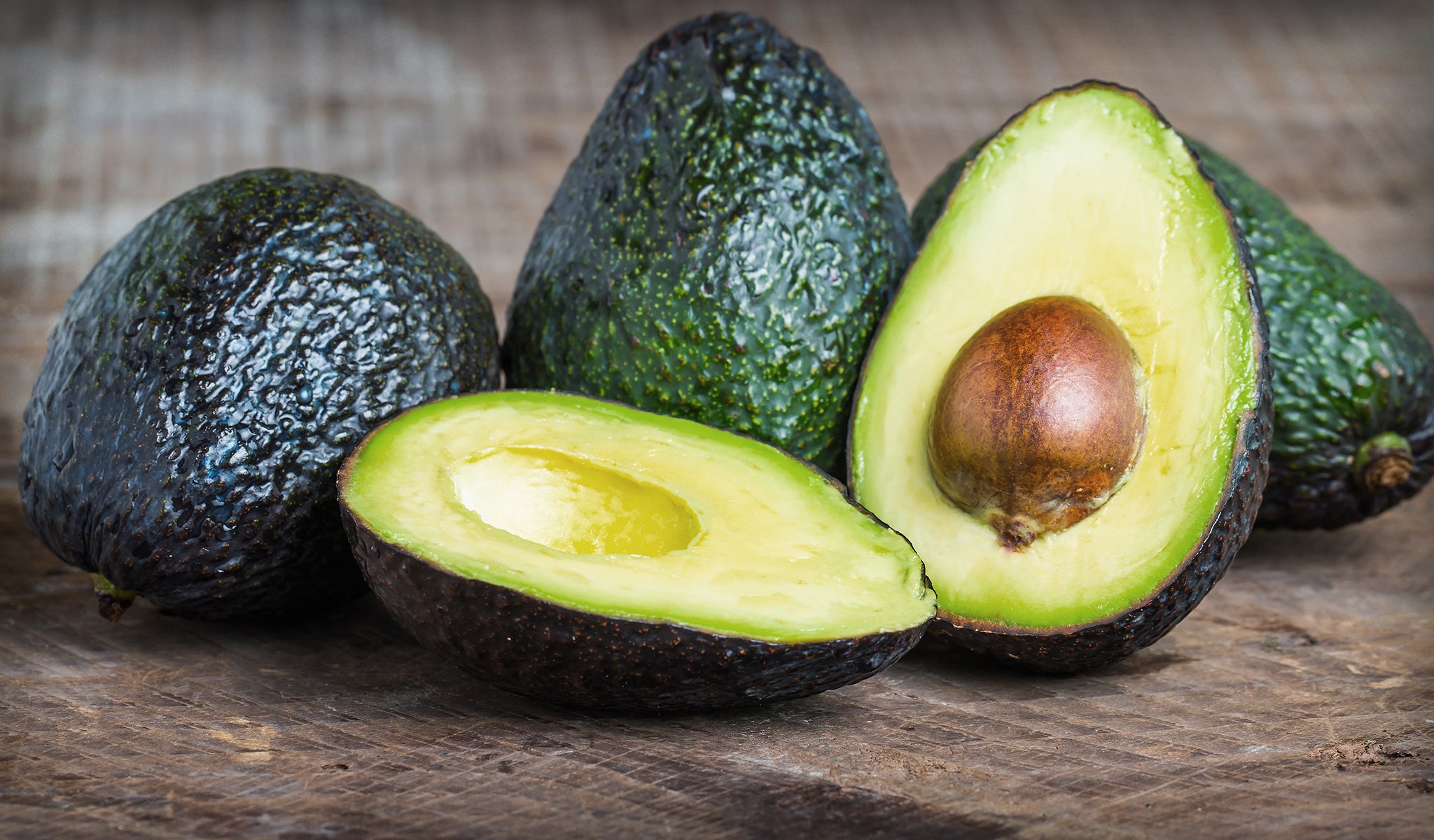WE'RE SO EGG-CITED..!!
There are many types of eggs in nature with various health benefits, tastes, and appearances. Since chicken eggs are the ones most of us have access to and think of when we think of eating eggs, we're going to focus on chicken eggs for this post.
An egg holds all the nutrition a developing young chicken needs. The color of the eggshell depends on the breed, most of them being white or brown, with some speckled. Inside this beautiful example of nature's engineering, are the egg and the yolk, which contains various fats, some vitamins and nutrients, cholesterol, and lecithin.
Eggs are an important and influential ingredient in cooking, as their particular chemical makeup is literally the glue of many important baking reactions, including foaming, coagulation, emulsification, and the ability to brown.
Because of the many ways eggs can be cooked, they can become virtually any texture from soft and creamy to firm and formed.
HISTORY
Since the domestication of the chicken more than 4,000 years ago in the region of what is now Thailand, people have been enjoying and nourishing themselves with the egg. As a long-time symbol of fertility and rebirth, the egg has taken it’s place in religious as well as culinary history. In Christianity, the symbol of the decorated egg has become synonymous with Easter. The eggshell paint in tradition has been popular in many countries, including Greece, China, Egypt, and Persia. Even today the Fabergé egg, originally decorated as Easter tributes for the Russian royalty, is a museum favorite.
NUTRITIONAL HIGHLIGHTS
Eggs are an excellent source of vitamin K and a very good source of the B vitamins, including biotin, thiamine, and vitamin B 12. They are also a very good source of selenium, vitamin D, and protein. Some eggs contain omega-3 fatty acids depending on what the chickens have been fed. The omega-3 content varies, and these eggs are usually labeled as containing omega-3 fatty acids. Otherwise, commercially produced eggs contain virtually no omega-3 fatty acids.
BENEFITS
Eggs are a very good source of low-cost, high-quality protein and cholesterol that is vital to hormone production and brain health.
Eggs are rich in several nutrients that promote heart health. For example they are a rich source of betaine. Researchers from the Netherlands have found that betaine can reduce levels of homocysteine, a metabolite of the amino acids methionine and cysteine. Homocysteine can damage the blood vessel walls. Not surprisingly, elevated homocysteine levels are linked to increased risk for heart disease as well as other chronic diseases, including neural tube defects, osteoporosis, Alzheimer’s disease, and cancer. Like folic acid, betaine plays a role in converting homocysteine to non-damaging forms. Folic acid is the primary agent in the conversion of homocysteine in all cells, while betaine’s methylation activity is confined mainly to the liver.
Eggs are also a rich source of choline, a key component of many fat containing structures in cell membranes, providing flexibility and structural integrity to fat-like molecules in the brain, phosphatidylcholine and sphingomyelin, account for an unusually high percentage of the brain’s total mass, so choline is particularly important for brain function and health. Choline is also involved in homocysteine metabolism and is also the key component of acetylcholine - one of the brain’s key neurotransmitters. One large egg provide 300 micrograms of choline (all in the yolk) and also contains 315 mg of phosphatidylcholine.
During pregnancy and breast-feeding, an adequate supply of choline is particularly important, since choline is essential for normal brain development.
In traditional Chinese medicine, eggs are recommended to strengthen one’s blood and energy by enhancing digestive and kidney function.
SELECTION & STORAGE
Look for pastured, organic, or free-range. Since chickens are omnivores, ‘vegetarian-fed’ is something I tend to avoid. You want those girls running around a field snacking on weeds, grass, bugs, grubs and even mice.
Eggs should always be visually inspected at the store before buying. It is best to lift the eggs out of the carton and check for cracks and dried egg liquid on the box to ensure that there are no broken ones. Eggs from local farms can also be a good choice. While supermarket eggs are generally washed and cleaned for bacteria, farm eggs may not be, so it is best to ask you a farmer if he or she washes the eggs before selling.
Although eggs are not refrigerated in certain cooler climates and cultures, they are best stored in the refrigerator where they may remain for up to one month. Eggs that have a higher omega-3 fatty acid content are best eaten as fresh as possible to keep these oils fresh.
Since the eggshell is somewhat porous, it helps to keep the eggs in the carton to reduce their absorption of odors and compounds from other foods in the refrigerator. Eggs are best stored point down, as to keep the most beneficial placement of the air chamber and yoke. Try not to store eggs in the door as variations in temperature caused by opening and closing of the door can contribute to spoilage.
LET'S EAT
Some experts suggest that poaching, hard boiling, or soft boiling an egg is the most healthy method of preparing an egg because these methods heat the egg at a lower temperature, where boiling is at 212°F versus fried which can attain temperatures of up to 400°F or more. Furthermore, these methods keep the fats in the yolks from been oxidized before and during the cooking process. For anyone consistently eating eggs, poached or soft or hard boiled is recommended.
To reduce the possibility of contamination of your recipe with a spoiled egg, break each egg separately into a small bowl and visually inspected before combining with the other ingredients.
FINAL THOUGHTS
-
Eggs are high in a number of important nutrients. Although the exact amount can vary based on the type, size and cooking method, eggs are typically high in protein, selenium, vitamin A, phosphorus, riboflavin and vitamin B12.
-
Potential egg nutritional benefits include increased weight loss, better skin and eye health, enhanced liver and brain function and a reduced risk of heart disease and metabolic syndrome.
-
Free-range eggs, in particular, tend to be safer, more ethically produced and higher in several important nutrients.
-
There are many ways to enjoy eggs and they can be easily incorporated into many different recipes, making them a great addition to a balanced diet.
It's all about the QUALITY of the product (how many times have we heard that line?) Well, get used to it, because the same applies to EGGS. Make sure you are getting PASTURED EGGS. We love Vital Farms, but really, the best eggs are found at small local farmers who raise chickens and sell the freshest of the freshest eggs to the locals.

Another must have at the Rutherford's house is good HARD BOILED EGGS.. it's a GREAT SNACK..!! Cooking them in the pressure cooker is a great way to assure EASY PEELING and getting the timing down assures NO GREEN YOLKS.

Last but certainly not least, is having simple RTE (ready-to-eat) foods handy. We make big batches of what we call a BREAKFAST CASSEROLE. Really, it's nothing more that items you have in your fridge at the time. Could be anything from bacon, sausage, and cheese to only vegetables or any and all of the above. Whatever the combination, it's sure to be a quick, nutrient-dense snack on the go!
Remember, pastured eggs will have:
-
More VITAMIN D
-
More VITAMIN B-12
-
More VITAMIN A
-
More VITAMIN E
-
More FOLATE
-
and the best part is they TASTE BETTA.. !
Enjoy the INCREDIBLE EDIBLE EGG…
ONE MORE THING…
Be kind to chickens… they poop your breakfast...
- Dr. Axe



